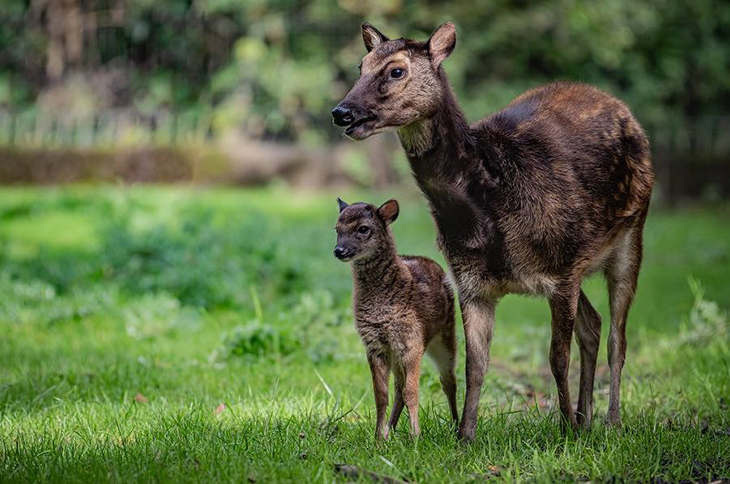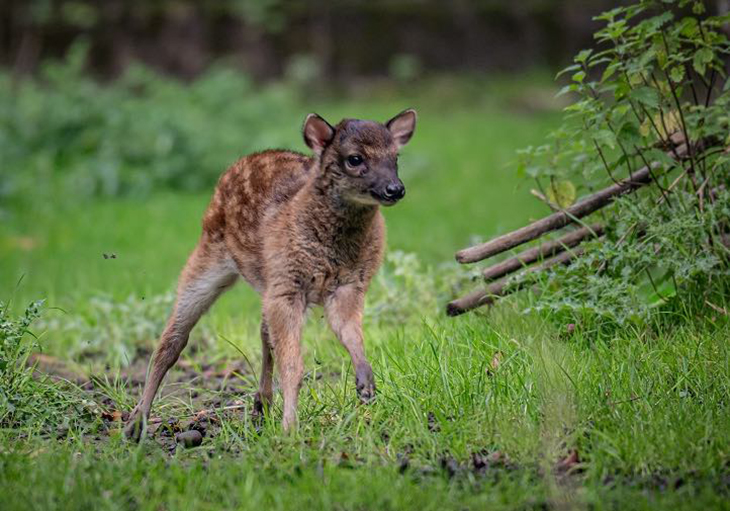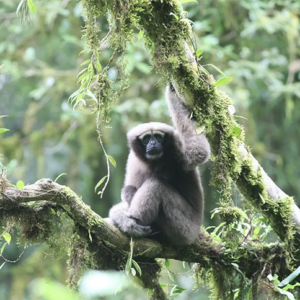
In another heartwarming development at Chester Zoo in England, the birth of a Philippine spotted deer, one of the world’s rarest animals, has brought joy to conservationists.
The adorable fawn, born in September, weighed in at 4.4 pounds – approximately 2 kilograms – and has already grown to a height of 12 inches. Recently, he took his first steps outdoors, exploring his new enclosure with his attentive parents, Nova and Cosmos.
This significant birth is part of a specialized breeding program aimed at providing vital support to a highly endangered species in the wild. Classified as ‘highly endangered,’ the Philippine spotted deer faces severe threats to its survival, making such conservation efforts crucial for its future existence.
The birth of this tiny fawn was a result of collaborative conservation initiatives among European zoos, initiated at the request of the Philippine government. The goal is to secure the future of the species through carefully managed breeding programs and the establishment of protected environments.
As an ode to one of the more popular star constellations, the zookeepers have decided to name him Hercules.
Team manager at the zoo, Emma Evison, said, “After eagerly waiting 240 days for his arrival, it was a huge relief when we saw a little bundle of fur curled up next to mum Nova one morning.”
“She’s a great mum and has been doing everything perfectly so far – feeding him every few hours and keeping him right by her side.”

“We have a team tradition of naming newborn deer within the theme of ‘space’ and, given the importance of our new arrival to his species, we decided to name him Hercules, after the constellation of stars,” she added.
“Philippine spotted deer are incredibly rare and their decline has, for the most part, flown under the radar and only a few hundred now remain in the wild. Every birth is therefore absolutely critical in boosting the safety-net population in conservation zoos across Europe,” she explained.
Stuart Young, the regional field program manager for South East Asian Islands at the zoo, emphasized the dire situation faced by the Philippine spotted deer.
He said, “Philippine spotted deer have already disappeared across many parts of the Visayan islands, where they were once found roaming in large herds. Hunting and deforestation has led to the animals now only being found on two small islands, the islands of Panay and Negros.”
The decline in their population prompted conservation efforts, leading to the successful reintroduction of 32 Philippine spotted deer into a protected nature reserve in 2020.
“Since then, a number of births in the wild has almost doubled the population and we’re very happy to report that they are thriving,” he added.
Despite the positive strides in conservation, Hercules, the young fawn, still has considerable growing to do. The caretakers at Chester Zoo express their optimism that he will live up to his celestial namesake and play a vital role in the continued survival of his species.
The hope is that Hercules, with time, will contribute to the growth and stability of the Philippine spotted deer population.
What are your thoughts? Please comment below and share this news!
True Activist / Report a typo


